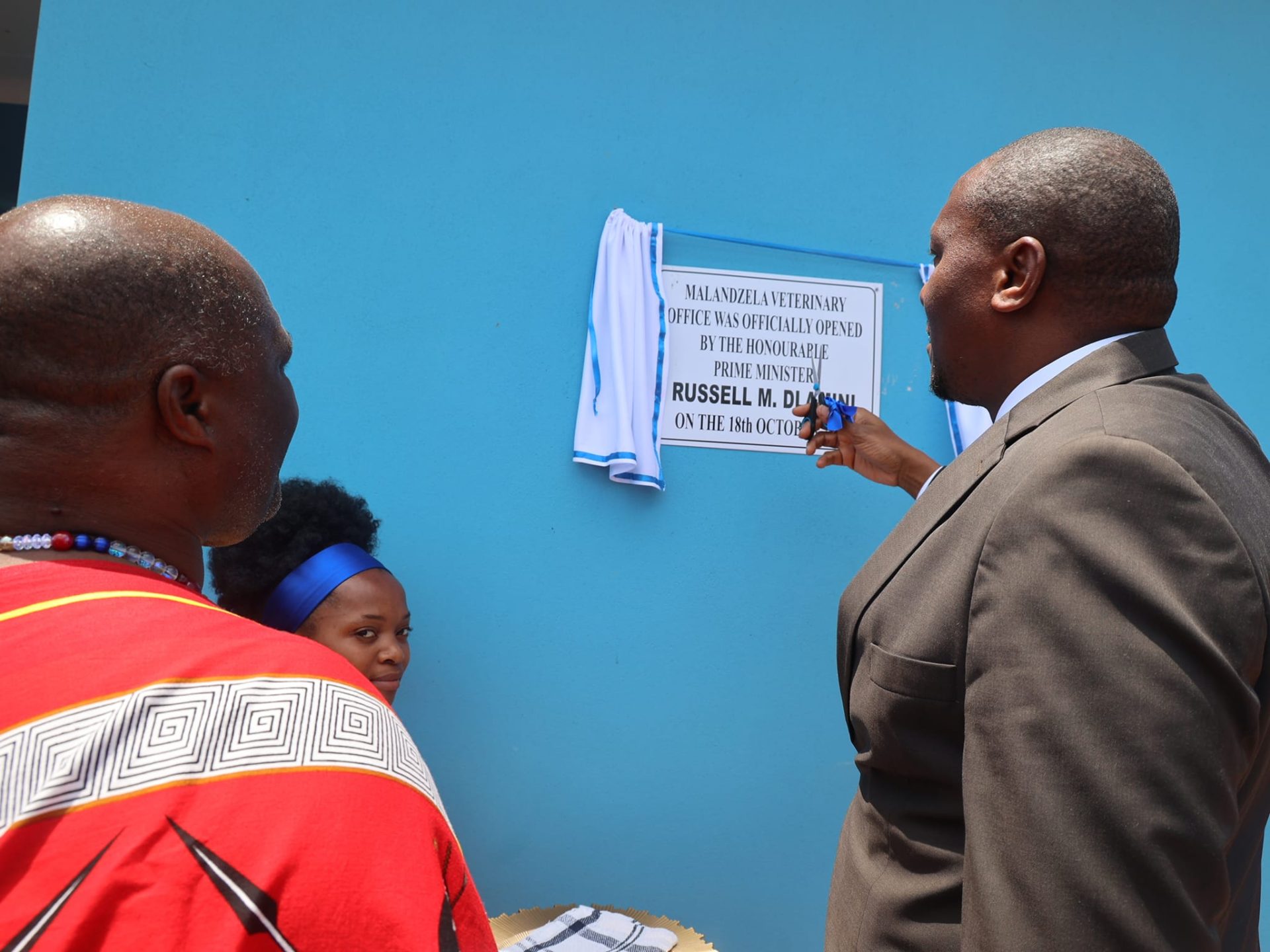By Ncaba Ntshakala
PRIME Minister Russell Dlamini has urged farmers to enhance their livestock operations to satisfy domestic consumption needs and take advantage of profitable international export opportunities.
During the official opening of the E2.1 million Malandzela Veterinary Offices and staff housing in Maphalaleni,
Dlamini underscored the pivotal role of agriculture, particularly livestock production, in the government’s strategy for sustainable economic growth.
“This initiative is in line with our vision for the next five years, which seeks to reshape the mindset of emaSwati,” he stated, referring to the government’s broader goal of fostering a belief that Eswatini can reach development levels similar to those of other nations.
RELATED: Eswatini Bank provides credit guarantee with 20% cash over to farmers.
“We must work together with the government to realize the King’s vision for progress.”
The Malandzela Veterinary Offices project is financed through the Regional Development Fund (RDF).
Dlamini pointed out that establishing such facilities in rural areas is a strategic decision aimed at bringing services closer to the community, thereby encouraging economic engagement in remote locations.
“Livestock is a source of wealth,” he remarked, adding that bolstering the livestock sector will invigorate local economies through sales within Eswatini and abroad.
Dlamini noted that Eswatini is well-positioned to benefit from international markets, mentioning countries like Norway, Taiwan, the United Kingdom, and the European Union as potential buyers of Eswatini beef.
He emphasized the need to actively explore additional opportunities, particularly through the African Continental Free Trade Area (AfCFTA).
“These markets offer significant growth prospects, and we need to seize them to unlock the potential of our agricultural sector,” he commented.

The Prime Minister also highlighted the increasing demand for livestock, indicating that a single cow in the region can fetch as much as E15,000.
He encouraged farmers to invest in feedlots and expand their herds, as livestock not only generates income when sold but also opens up avenues for beef export.
“While it’s encouraging that most of the meat consumed locally is produced here, we should aim to supply even more global markets,” Dlamini stated.
Eswatini’s agricultural sector is the second-largest contributor to the economy, following the manufacturing sector.
According to the International Trade Administration, commercial agriculture primarily comprises sugar, canned fruit, and beef production for export.
In addition to subsistence farming, the country meets much of its agricultural product demand through imports from South Africa.
The sugar industry is crucial for Eswatini, contributing about 5 percent of GDP and providing around 20,000 jobs.
RELATED: Bee farmers are stranded with honey, no market
Approximately 92 percent of sugar production is exported, and Eswatini fulfills its tariff-free export quota to the United States each year.
he beef value chain is rapidly expanding, accounting for 2.9 percent of total GDP and 32 percent of total agricultural GDP in 2018.
Eswatini Meat Industries (Embiveni) is the only licensed exporter, and Eswatini beef enjoys preferential tariff-free access to the European Union (EU) market through the Economic Partnership Agreement, alongside an export contract with Norway, although exports remain below the quota.
In the long term, Eswatini could broaden its export market to include SACU member states and through AfCFTA, where it could export value-added meat products.
The Prime Minister emphasized that the government’s economic agenda, which aims for a 12% annual GDP growth rate, relies on collaboration among citizens, businesses, and the government.
Dlamini underscored the significance of joint efforts to achieve these objectives, noting that the RDF and the Micro Projects initiative under the Ministry of Economic Planning and Development have been instrumental in alleviating poverty by funding essential infrastructure projects in both urban and rural areas.

Regarding food security, Dlamini urged emaSwati to utilize the rainy season for planting crops to combat hunger.
“It’s time to move beyond subsistence farming and start producing surplus crops for the market,” he stated.
He encouraged farmers to diversify their crops, including high-value options like beans, which can yield greater profits. “We must take pride in agriculture and reduce our dependency,” he emphasized.
However, the Premier expressed concerns about the increasing incidents of livestock theft, which he said jeopardizes the livelihoods of hardworking citizens.
“Some thieves even smuggle stolen cattle across borders, which is utterly unacceptable. Everyone must contribute to combating this crime by reporting suspicious activities to the authorities,” he urged.
In addition to addressing theft, Dlamini condemned the rise of gender-based violence in the nation. He labelled the escalating incidents of violence against women, children, and men as a national crisis.
“We must unite to eradicate this behaviour. If overwhelmed by emotions, it’s better to step away and seek peace rather than resort to violence,” Dlamini advised.
He stressed that violence leaves enduring scars not just on families but on communities and the nation as a whole.
In concluding his address, Dlamini called on the residents of Maphalaleni to take responsibility for safeguarding public infrastructure, such as the newly opened veterinary offices.
“It’s disheartening to witness valuable government facilities being vandalized when they are intended to serve the people. Let us take ownership of these resources and utilize them wisely,” he remarked.


